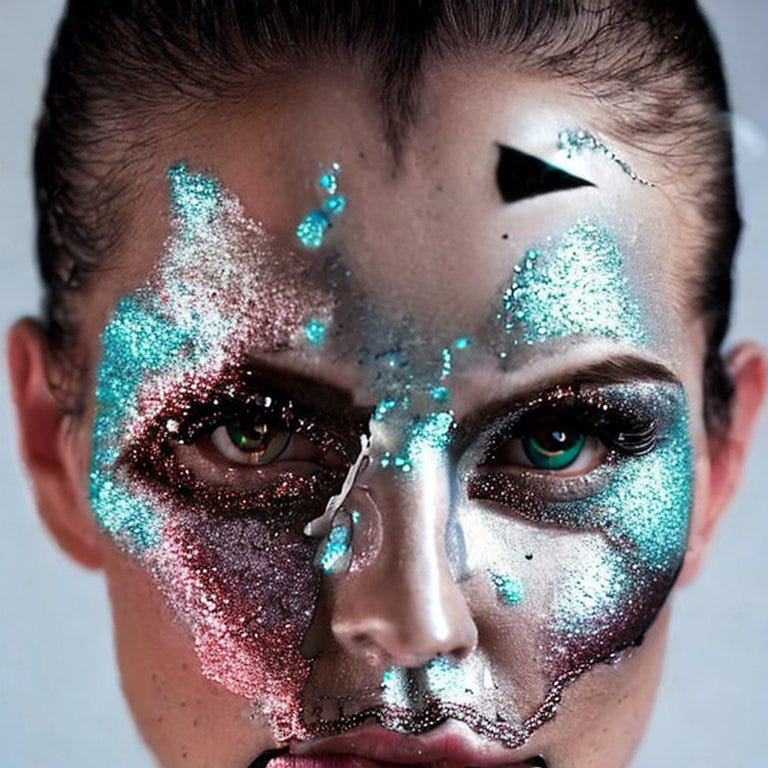I am not a fan of disclaimers or introductions. So frankly, if you are OK with me changing my mind about the ever-shifting terrain of Artificial Intelligence and our online lives in general, I give you a hall pass. Please skip this paragraph. But if you must understand my change of heart, here we go: I have recently undergone a change of perspective on the future of AI, moving from skepticism to optimism. Last week the glass was half-empty, now I see it as half-full, plus the Kool Aid is electric. It all has to do with how we approach AI. Most people will rely on AI (ChatGPT, Dall-E, etc.) to do all the heavy lifting. All this will do is make it harder for hacks and bores to stand out. The smart among us will take what ChatGPT gives us and edit it, punch it up. Bad creatives will pass off robot work as their own. Those who roll up their sleeves and get to work with the robots will be the cyborgs that we look up to in the coming years. While AI has the ability to generate impressive amounts of text, it's important to remember that it lacks the creativity, nuance, and empathy that we possess. Rather than attempting to pass off AI-generated content as ours, we would be better served by using it as a tool to enhance and shape our ideas. By taking advantage of AI's speed and accuracy, we can focus on the more imaginative and conceptual aspects of content creation. As somebody with experience in journalism, I can tell you that there was just as much fun in editing as in writing, sometimes more. For years, the Internet has been a writer’s medium. Now, with AI, it will be an editor’s medium (or a director’s medium as it gets more cinematic).
I just pulled a slight variation on a by-now hack trick: the above paragraph was written with the help of ChatGPT. The little that was actually written by ChatGPT was edited and rewritten by me. The rare sentences that were actually fully lifted by the site were too serviceable and necessary to justify changing. OK on to the next vibe shift (here is the first vibe shift for context).
Virality—or the possibility of going viral—is the point of all present culture. There is no good or bad, just more amplification or less. Received forms are melted down for the viral ore. Film becomes video; novel becomes screen-shotted paragraph; essay becomes the commentary-generating “piece”; poem becomes a blob of language which no one will ever bother to memorize. The whole becomes fragment; the vision becomes snippet.
Playwright Matthew Gasda’s intro paragraph for his Compact magazine article on how artists can avoid the pitfalls of fame-seeking was published on August 12 last year. Downright quaint compared to this recent development:
A new startup called Rizz…lets you generate social media content or messaging content in seconds, using AI. The input “Generate a funny one-liner for my hinge match, she likes boba” produces the output “Hey there, care to grab some boba and see if we’re a matcha made in heaven?”
The difference here is that up until recently it was assumed that we wanted attention for our content, our writing, our thoughts, our beliefs. What the above makes clear is that Gen Z wants attention regardless of the reason. This comes as a surprise until we look at books like The Twittering Machine that help us understand that we are addicted to attention. Through this lens, it makes sense that Gen Z will do anything for attention much as we understand that a street junkie will not only steal for heroin, but will inevitably have no choice.
So this is part one of the next vibe shift then: attention at all costs. This might help explain the Twitter anons who write gleefully offensive posts, if only to stand out from the black squares and rainbow flags. Even more though, we understand how Instagram Reels are about drunk driving gorillas, inappropriate emo songs for fallen homies, self-deprecating videos about AI racism, dramatic escapes from subway performers….in other words less takedowns and analyses of what is woke and what isn’t. We can even say this is part two of the next vibe shift then: naked ambition over political proselytizing.
This is not to say of course that there are no principles that guide the new generation whatsoever, but that the new causes like antiwork, are lived-in. They directly apply to every member of Gen Z. Compare this to the ‘10s, where causes like BLM and MeToo had white male allies that acknowledged that they need to listen because they are privileged and they are part of the problem. Now, if you are Gen Z and are not a CEO, there is no barrier to entry to entering the antiwork movement (unless of course you are drunk on the puritanical, Calvinist Kool-Aid that has powered this nation for centuries).
This takes us to part three of the next vibe shift then: hope that AI accelerates our job-free future and gives us UBI. Now there are fears that AI will get rid of creative jobs as well as grunt work. And if you are dim enough to rely entirely on AI to do your work (over-reliant) or to rely only on your own talent (under performing) then yes it will be a bleak future. But as many of us in the UBI future will have basic needs met, our thirst for attention will only increase and we will use AI like poker bots to help win us that attention (or maybe even a little extra money). 1
This takes us to the crux of my very own change of heart on the issue. As I have stated in the past, we were more slavishly reliant on AI in the past decade than we are now. For years, we have (and still are) contorting our personalities, our faces, etc. so the Algorithm can bestow upon us the gift of fame. Now with the tools of AI in our corner, we have more control over AI. We are now collaborating with AI not toiling for it. A future where we tell AI what we want is better than a past where we pathetically asked AI what it wanted from us.
For much of their relevant years, Millennials were robots. Adding relevant hashtags, fine-tuning everything for SEO optimization, oversharing to each other and thus investing more in online interactions than IRL ones. Gen Z, like the glam rockers of the ‘70s, are more media savvy. They know full well (this is part four of the next vibe shift btw) that the Internet is full of malicious bots and psy ops, so being vulnerable on a medium that was invented by the CIA solely to keep tabs on potential insurgents might not be the safest bet.
Another parallel between Gen Z cyborgs and glam rockers is, of course, their love of glamour. This Vox article on antiwork begins by discussing a viral TikTok rant that says “I don’t have goals. I don’t have ambition. I only want to be attractive.”
 Tiktok failed to load.
Tiktok failed to load.Enable 3rd party cookies or use another browser
Though this may understandably read as sad or pathetic to most, in light of a UBI future where most don’t work, this may be our only real currency. Or, as Simon Reynolds reads Oscar Wilde in his excellent glam rock book Shock and Awe:
“‘Beauty is a form of Genius,’ a force that rules by ‘divine right’, Wilde writes. ‘It makes princes of those who have it.’ Beauty is atavistic and anti-modern, an enclave of aristocratic intransigence in the face of the ugly nineteenth-century England – that ‘dim, dull abyss of facts’ – birthed by the Industrial Revolution and the mercantile middle classes.”
This particular TikTok has interesting connotations for our post-work future. When we all have the same UBI income, how will we live? There may be many who are depressed slobs living out goblin mode nightmares. But is it too far fetched to imagine a future without work where we all aim to live like aristocrats, choosing the best manners, the best conversation, etc.? The aristocracy for centuries did not labor, so they were philosophers. Scientists. Poets. The Industrial Age did away with all that and new money was more vulgar, careerist. I would truly be barmy to say that next year we will be aristocratic cyborgs being served by robot slaves, but this does certainly seem to be the dream of a post 2.0 world that already places a premium on artisanal food over fast food.
Or, also, we can say that, after years of fears of reality exhaustion, Gen Z has decided to openly embrace our post-truth world and embrace the online space as one of escape and fantasy rather than one of truth and news. Indeed, it may seem that journalists may be the first to be sent packing from the cyber Eden. Nothing new of course. Radio journalism’s market share declined greatly in the newsreel era. TV journalism made newsreels irrelevant. As radio journalism declined, radio became a rock and roll slalom course of sexual fantasy. As newsreels proved more irrelevant, films became more consumed with spectacles. As TV journalism lost market share to Internet news, Peak TV came barreling through. Creativity and fantasy may be the only real options for new media. Part five of the next vibe shift: online may be less a place for us to communicate and more a place for Gen Z to peacock, to perform, to play.
And this actually leads directly to part six of the next vibe shift: identity creation will be a top down process more than a bottom up process. For the past decade, we have contorted themselves into stock characters in order to please the fickle algorithm god. This is also responsible for the fast fashion crisis.
Now I still believe that this article comparing today’s influencers with yesterday’s flanuers and dandies may miss the mark a little in light of the fast fashion crisis. But I believe that AI might help Gen Z turn identity creation from a bottom up process to a top down process. I say this because this is the one thing all generative AI apps like Chat GPT and Midjourney have in common: they all rely on you typing something into the prompt bar. So this recursive process of typing the query, looking at the query and (if you’re smart) editing or altering the query to your own taste may lead to a future where fast fashion trends are replaced by influencers, creatives and personalities having their own individual styles.
And I do agree with this article that this form of self-creation may prove to be a valid online religion. Or at least the most relevant (part seven of the next vibe shift). I started this post by editing a Chat GPT paragraph but for my closer, I will give Tara Isabella Burton the last word (and then a link to my glam rock playlist).
How can I be so sure of UBI? Only as sure as I can be of bots taking our jobs. A future without UBI is a future where we still have our jobs. Since I would have to rightfully assume that a capitalist society would love nothing more than a nation of full time consumers, I doubt that we will not have some sort of work free income.






Dyin to know: What was the prompt you used for the first paragraph?